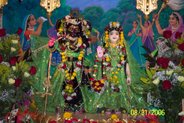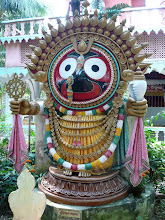
http://iskcondesiretree.com/portals/0/AIC/2008/08-03-06_AppreciatingVariousFormsOfKrsna(SB-7_4_30)HHKadambaKananaSwami.mp3
Just tuning into this morning's class at Chowpatty,
Appreciating Various Forms Of Krsna by HH Kadamba Kanana Swami. Wow I never heard him before- I like the way the harmonium is being played- I just know it's going to be a great class. Thanks iskcondesiretree.com!!!
It was a really good class. I looked into his website to find more classes and bhajans was happy to find http://www.kkswami.com/
interesting he is a disciple of HH Jayadvaita Swami as I was just relishing listening to his class the night before.
Below is another excerpt in glorification of Lord Siva.
Namo Sivaya
MERCY AND CHEATING
by Madhavananda das
The following article appeared in Sri Krishna Kathamrita magazine issue 7 "Lord Shiva the Greatest Vaishnava", published by ISKCON Gopal Jiu Publications.
Common people generally judge a great personality according to the qualities of his or her followers. They also usually think that the dearest follower of that personality must be the one that has received the most facilities, attention, and position from that great person. How then do we understand Lord Shiva and his distribution of mercy? Many powerful demons such as Ravan, Banasura, Vrikasura, and Sudakshina worshiped Shiva. By all appearances it seems that each of these demons were very dear to him and received his mercy. Shiva even went so far as to fight against Lord Krishna on behalf of his devotees Banasura and Sudakshina. Certainly those were signs of his mercy! Or were they?
MERCIFUL TO ALL
Lord Shiva is famous as asutosa, "he who is easily pleased". He is very easily pleased and he is very quick to give benedictions. Like Lord Shiva, his consort Maya-devi is also very free in distributing mercy to everyone, including even the demons and impersonalist mayavadis. In his footnote to Hari-nama-cintamani (7.61), Thakur Bhaktivinode comments on the nature of their mercy on such persons:
"In the material world the mayavadis worship Goddess Maya and chant her names like 'Durga' and 'Kali'. Lord Krishna's spiritual potency is His personal potency. Maya is the shadow of that spiritual potency. Gradually purifying them, Goddess Maya convinces the rebellious souls who have turned their faces away from Lord Krishna to turn and face Him again. Maya has two kinds of mercy: sakapata-krpa, mercy with cheating, and niskapata-krpa, mercy without cheating. When she gives sincere mercy, she gives to the conditioned soul true knowledge and devotional service offered to Lord Krishna. When she gives cheating mercy she gives to the soul temporary material pleasures. The limit of this cheating mercy is when she throws the soul into the state of merging with impersonal Brahman. When that happens to the soul, all is lost."
Lord Shiva has two types of mercy, niskapata-krpa, mercy without cheating, and sakapata-krpa, mercy with cheating. An intelligent person should understand the difference, and aspire for Lord Shiva's niskapata-krpa. Although it appears that Lord Shiva is being merciful to the demons when he grants them benedictions, in actuality they are not recipients of Lord Shiva's real mercy.
SERVICE NOT ACCEPTED
A good example is Ravan, the demoniac king of the raksasas. Ravan worshipped Lord Shiva, and it would seem that Shiva favored him since he granted Ravan so much wealth and power. However, Srila Vrindavan Das Thakur has given a penetrating look at Ravan's service to Lord Shiva and shown that actually Ravan did not please Shiva at all. In his Sri Caitanya-Bhagavata (madhya 10.148-149), Vrindavan Das states:
siracchedi bhakti yena kare dasanana na manaye raghunatha - sivera karana
"Ravan worshiped Shiva but would not worship Lord Ramachandra. For this offense Ravan's ten heads were cut off."
antare chadila siva, se na jane iha seva vyartha haila, maila savamse pudiya
"In his heart, Lord Shiva rejected Ravan and did not accept his service. Ravan did not know this. Ravan's service to Lord Shiva was all in vain. In this way he and his family were all destroyed."
SIVA-TATTVA IS GURU-TATTVA
Aside from being worshiped by the demons, Lord Shiva is also the guru of many great krsna-bhaktas. The fourth canto, twenty-fourth chapter of Srimad Bhagavatam describes how Shiva bestowed his mercy upon the Prachetas, by which they became great devotees of Lord Krishna. The twelfth canto, tenth chapter describes how Markandeya Rishi worshipped Shiva to get devotion to Krishna. In the Brahma-vaivarta Purana (4.13.72) Garga Muni describes himself as a disciple of Lord Shiva. He says that Lord Shiva taught him the glories of Krishna's name. The Narada-pancaratra, first ratra, chapters eight and nine, describes that Shiva acted as guru for the great devotee Narada Muni.
In his purport to Srimad Bhagavatam (4.2.2), His Divine Grace A.C. Bhaktivedanta Swami Prabhupada describes Shiva as being guru for both the demons and the devotees:
"Lord Shiva is described here as caracara-guru, the spiritual master of all animate and inanimate objects. He is sometimes known as bhuta-natha, which means "the worshipable deity of the dull-headed." Bhuta is also sometimes taken to indicate the ghosts. Lord Shiva takes charge of reforming persons who are ghosts and demons, not to speak of others who are godly; therefore he is the spiritual master of everyone, the dull and demoniac, as well as the highly learned vaisnavas. It is also stated, vaisnavanam yatha sambhuh - Shambhu, Lord Shiva, is the greatest of all vaisnavas. On one hand he is the worshipable object of the dull demons, and on the other he is the best of all vaisnavas, and he has a sampradaya called the Rudra-sampradaya."
In His Sivastakam prayers (text 7), quoted by Murari Gupta in his Sri Caitanya Carita Mahakavya, Sri Chaitanya Mahaprabhu describes Lord Shiva's position as guru, sivaya sarva-gurave namo namah - "I repeatedly offer my obeisances to Lord Shiva, who is the guru of everyone." Sri Srimad Gour Govinda Swami has also commented on this point:
"This siva-tattva and guru-tattva are the same. Guru and Bhagavan, Shiva and Bhagavan, have a very intimate relationship, priya-sakhya, a relationship of lover and beloved, premi-premastata. In that sense there is no difference between Shiva and Krishna, guru and Krishna."
In many places it is described that the guru is considered to be a manifestation of Lord Shiva. Sri Hari-bhakti-vilasa (4.139) says:
gurur brahma gurur visnur guru devo mahesvarah gurur eva param-brahma tasmat sampujayet sada
"The guru is Lord Brahma. The guru is Lord Vishnu. The guru is Lord Shiva. The guru is the Supreme Absolute Truth, therefore always worship Sri Guru with all you possess."
Narada Purana (63.121) says:
diksaya guru-murti-sthah sarvanugrahakah sivah
"Through diksa, Shiva, the giver of all benedictions, is manifested in the form of the guru."
The same point is made again in Narada Purana (65.58):
om namas te natha bhagavan sivaya guru-rupine
"I offer my respectful obeisances unto Lord Shiva, who has assumed the form of guru."
SUBSTANCE AND APPEARANCE
Siva-tattva and guru-tattva are also the same in the sense that both Shiva and guru are krsna-krpa-sri-murti - manifestations of Krishna's mercy. In Bhagavad-gita (4.11) Krishna has described, ye yatha mam prapadyante tams tathaiva bhajamy aham - "As a person surrenders to Me, I reciprocate with him accordingly." Similarly, as manifestations of Krishna's mercy Shiva and Sri Guru also reciprocate according to the motive of the worshiper. Although they are merciful to all, it's not that everyone who approaches them gets the same thing. To sincere persons they give niskapata-krpa, mercy without cheating, and to duplicitous materialistic persons they give sakapata-krpa, mercy with cheating.
Srila A.C. Bhaktivedanta Swami Prabhupada (Bhag. 1.13.37 purport) describes the topic of cheating:
"That great souls cheat others may be astonishing to know, but it is a fact that great souls cheat others for a great cause."
On another occasion (lecture, 21 May 1969) Srila Prabhupada made a similar comment:
"[Buddha] situated the atheistic people on the line of understanding God. So this is, in one way, cheating. But this cheating is not cheating. Just like a father or guardian sometimes cheats the young boy. That is not cheating; that is for his good."
The Lord's Mohini Murti pastime as described in the eighth canto, chapter nine of Srimad Bhagavatam is a good example of niskapata-krpa and sakapata-krpa. When Mohini Murti began to distribute nectar, it didn't seem that She was paying any attention to the demigods. She was seen to be smiling and casting glances only on the demons. However, while it appeared that She was favoring the demons, in actuality She was cheating them and giving all of the nectar to the demigods. In the same way, because of the attention and approval showered on them by Shivaji and Sri Guru, sometimes persons with selfish motives appear to have obtained great favor, but in actuality they are being cheated while genuine mercy is quietly being given to others.
Bahirmukha-janas, "outward-facing" persons such as the demon Ravan, absorbed in external things, are full of passion and equate receiving material opulence, position, and recognition from Shiva or guru to be mercy. However, antarmukha-janas, introspective persons such as Markandeya Rishi, recognize that the real mercy of Shiva and guru is gained when they become truly pleased. They understand that the niskapata-krpa of Shiva and guru is not manifest in external things such as receiving opulence, high position, or public shows of approval from guru and Shiva. Rather, it is in obtaining krsna-prema. Materialistic followers who approach great personalities such as Durga, Shiva and Sri Guru and with their lips cry out, krpa koro, krpa koro - "Please give me your mercy! Please give me your mercy!" while internally desiring something material, are given what they want, but are deprived of real mercy. They are the recipients of sakapata-krpa, not niskapata-krpa.
Like Lord Shiva, Sri Guru externally accepts everyone's service, and, like Lord Shiva, it is not always easy to know if he is actually pleased or not. Thakur Vrindavan Das has described (Cb. madhya 10.150):
bhala manda siva kichu bhangiya na kaya yara buddhi thake, sei cinte buddhi laya
"Lord Shiva does not reveal whether he is pleased or displeased with his servant. A person who is intelligent can understand in his heart whether Lord Shiva is pleased or displeased."
PURE DEVOTEE'S KICK
In his commentary on Caitanya-bhagavata (adi 17.154-158) Srila Bhaktisiddhanta Saraswati Prabhupada says that even the mere desire for niskapata-krpa is rarely found in conditioned souls. He says that the only hope for most is to get the merciful kick of a pure devotee:
"The community of arrogant persons will take millions and millions of births to understand Vrindavan Das Thakur's causeless mercy, so until their offenses are exhausted they will never have the opportunity to receive a kick on the head from the sanctified all-auspicious feet of a pure vaisnava. Even the genuine desire for receiving the niskapata-daya, non-duplicitous mercy of a pure vaisnava, is a rare commodity for ignorant mundane sinful people, pious fruitive workers, or mental speculators. Living entities who are averse to Hari, Guru, and vaisnava have not accumulated sufficient piety in their previous lifetimes, nor have thousands of their forefathers accumulated sufficient piety, that they are qualified to receive the all-auspicious kick from the lotus feet of the pure, transcendental, ultimate-benefit-awarding lotus feet of Thakur Vrindavan. The moment that dust from the lotus feet of a pure vaisnava will fall on the heads of sinful persons, that very moment they will become free from all material contamination and deceit and thus become proprietors of the wealth of devotional service."
For a free subscription to our email mini-magazine "KK Bindu" write to us at: katha@gopaljiu.org
or visit our website: www.gopaljiu.org


